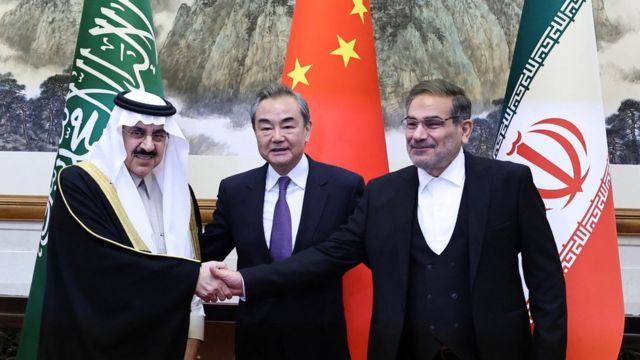The Ambassador of the Republic of Yemen in Tehran, Ibrahim Al-Dailami, confirmed that the Saudi regime failed in its attempt to influence Sanaa political and military position, and that the only way for Riyadh to find peace with Yemenis is to stop the aggression and siege imposed on them, and begin serious negotiations with Sanaa, warning that the continuation of the blockade will lead to entering a new phase of confrontation.
Al-Dailami revealed in an interview with Al-Manar TV that the Saudi regime tried to exploit its negotiations with Tehran during the last period to influence the political and military decision and position of Sanaa.
"The Iranians made it clear to the Saudis during the meetings that the relationship with Yemen is one of sincere brotherhood, and that the aggression and blockade must end," he added.
The Iranians assured Saudi Arabia that “the decision is in Sanaa, not in Tehran.”
Al-Dailami commented on the recently announced Iranian-Saudi rapprochement agreement by saying, “If the understandings bring peace in the region, it will be in the interest of everyone, but the Saudis are the ones who want to change in the region.”
For his part, Yemen's ambassador to Syria, Abdullah Sabri, said: The Iranian-Saudi agreement is encouraging, and we are waiting to see to what extent its implementation will be, as it is an inauguration of a new phase of consensus, noting that China's sponsorship of the Iranian-Saudi agreement show that China, as an international power, has become more flexible and free from traditional procedures.
Ambassador Sabri confirmed: “We reached a truce in Yemen about a year ago as a result of the Yemeni force. Consequently, Saudi Arabia understood that it was incapable of a military solution.”
Many reports revealed during the past periods that Saudi Arabia is trying to seek help from the parties of the axis of resistance to influence the decision of Sanaa, and push it to back down from its negotiating position and its demands. However, the responses received by Riyadh all confirmed that the decision can only be found in Sanaa, and that it must negotiate directly with the Yemenis and respond to their demands represented in ending the aggression, siege, and occupation.
In another context, Ambassador Al-Dailami considered that “the first phase of the aggression ended during the past eight years, but the siege continued.”
He added that the continuation of the blockade will lead to a new phase of the war.
The leader of the revolution, Sayyid Abd al-Malik Badr al-Din al-Houthi, recently confirmed that the current state of "de-escalation" will not continue indefinitely, warning the forces of the aggression coalition and its sponsors that "patience will run out", in a clear message pointing to the need to stop procrastination and prevarication.
Earlier, the armed forces called on the countries of aggression not to miss the opportunity for peace on offer, and to take the warnings of the leader of the revolution seriously.
A member of the Ansar Allah Political Bureau, Mohammed al-Bukhaiti, warned a few days ago that "negotiations may not succeed, and the Yemeni people may be forced to wage a decisive battle to end the aggression and lift the siege."







